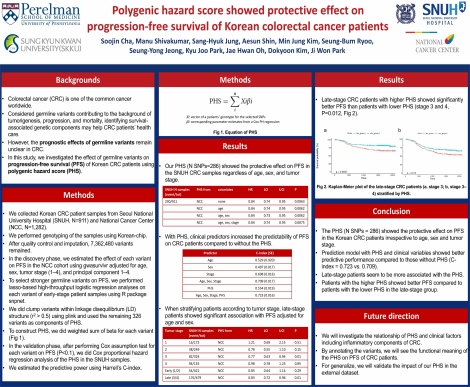Soojin Cha
Polygenic Hazard Score Showed Protective Effect on Progression-free Survival of Korean Colorectal Cancer Patients
Abstract
Colorectal cancer (CRC) is one of the common cancers in the world. Considered germline variants contributing to background of tumorigenesis, progression, and mortality, identifying survival-associated genetic components may help CRC patients’ health care. However, the prognostic effects of germline variants remain unclear in CRC. As a sum of the effect of variants on survival, polygenic hazard score (PHS) can be used to stratify patients who have more risky genetic components, we have studied to identify the PHS for progression-free survival (PFS) of CRC patients. In this study, we genotyped 2,193 Korean CRC patients from the National Cancer Center cohort (NCC, N=1,282) and the Seoul National University Hospital cohort (SNUH, N=911). After imputation and quality control, over 7 million variants were considered to construct a polygenic hazard score (PHS) for PFS of CRC patients. In the discovery phase, we performed LASSO-based regression analysis using snpnet to identify PFS-associated single nucleotide polymorphisms (SNPs) of early-stage CRC patients (stage I/II, N=536) in the NCC cohort. After clumping (r2<0.5) and Cox assumption test, remaining 286 variants were used as PHS. We tested the impact of PHS on PFS of CRC patients of the SNUH cohort using Cox regression analysis. Intriguingly, PHS alone showed significant protective effect on PFS of CRC patients (HR = 0.84, 95% CI = 0.74 – 0.95, P value = 0.0063) and after adjusting by age, sex, and tumor stage, PHS showed significant effect (HR = 0.84, 95% CI = 0.74 – 0.95, P value = 0.0075) on PFS. Multivariable model with PHS and clinical variables showed better predictive performance compared to those without PHS (C-index = 0.723 vs. 0.709). Also, patients with higher PHS showed better PFS compared to those with lower PHS. Our results suggests that our PHS can be considered clinical predictor with clinical variables of CRC patients.
Keywords
Polygenic hazard score (PHS), Colorectal cancer, germline variants, Cox proportional hazard modelAbout Us
To understand health and disease today, we need new thinking and novel science —the kind we create when multiple disciplines work together from the ground up. That is why this department has put forward a bold vision in population-health science: a single academic home for biostatistics, epidemiology and informatics.
© 2023 Trustees of the University of Pennsylvania. All rights reserved.. | Disclaimer



